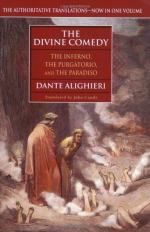|
|
The Inferno Topic Tracking: Literature/Mythology/Bible
Canto I
Literature/Mythology/Bible 1: Before entering Hell, Dante compares himself to æneas and Paul, and begins to doubt the path he has agreed to take. æneas is a character in Virgil’s poetry, supposedly the father of Sylvius, the founder of Rome, who descended to Hell. Also, according to medieval tradition, St. Paul visited Hell as well.
Canto V
Literature/Mythology/Bible 2: The second circle of Hell is populated by those who indulged in the lusts of the flesh. Included in the ranks are the mythological characters; Dido, Helena, Achilles, and Paris; a knight of King Arthur’s round table, Tristan; and Cleopatra. Dante speaks to two lovers who fell into an adulterous relationship while reading the story of Lancelot and Guinevere.
Canto VI
Literature/Mythology/Bible 3: The mythological three-headed dog, Cerberus, tortures the souls of the third circle of Hell. He barks and tears at them with his claws. When he barks threateningly at Virgil and Dante, Virgil throws clods of dirt into each of his three mouths. The Greek god of riches, Plutus, guards the entrance to the fourth circle in which the avaricious and prodigal are held.
Canto IX
Literature/Mythology/Bible 4: At the gates of the City of Dis, the three Furies threaten Dante and Virgil by suggesting they will bring forth the head of Medusa and turn Dante into stone. Virgil turns Dante away from them and covers Dante’s eyes with his own hands. The Furies depart when an angel from Heaven arrives.
Canto XII
Literature/Mythology/Bible 5: The seventh circle, where the violent are punished, is guarded by the Minotaur, half man half bull. He thrashes about violently while biting himself when the Poets pass him. Centaurs, half men half horses, guard the souls of the first ring of the seventh circle, who are guilty of committing violence against their fellowman.
Canto XIV
Literature/Mythology/Bible 6: Virgil says the source of all the waters of Hell is a spring within a giant mountain of a man, who stands on the island of Crete. His head is made of gold, his arms and breast of silver, his abdomen of brass, his legs and left foot of iron, and his right foot, upon which he leans, of baked clay. This image is taken from the Bible and is an allegory of the history of the human race. The four metals represent the four ages of man, and the iron and clay feet represent secular and spiritual authority respectively.
Canto XVII
Literature/Mythology/Bible 7: The half human half reptile monster, Geryon, guards the usurers of the seventh circle and the entrance to the eighth circle. In classical mythology Geryon is King of Spain, who Hercules killed in order to take his oxen. Dante and Virgil ride on his back down to the eighth circle. Dante compares his fear during this ride to that of two other mythological figures, Phaeton and Icarus.
Canto XXIII
Literature/Mythology/Bible 8: In the sixth ring of the eighth circle, Dante sees Caiaphas, a Jewish high priest, pinned to the ground crucifix-style and being trampled by his other fellow hypocrites. Caiaphas is recorded in the New Testament as advising a council of Jews to crucify Jesus, reasoning that it was better for one man to die than for all the people of Israel to suffer.
Canto XXVI
Literature/Mythology/Bible 9: Ulysses is punished in the eighth ring of the eighth circle for advising Achilles to leave his new wife to fight in the Trojan War. Dante adds to mythology by inventing the story of Ulysses death.
Canto XXXI
Literature/Mythology/Bible 10: The biblical character Nimrod and the mythological giants surround the ninth circle of Hell. Nimrod blows a horn and speaks unintelligibly. God confused his speech when he tried to build a tower that reached to the heavens. The giants who warred against the Greek gods, including Ephialtes, are chained to the ground in Hell; whereas Antæus, who was neutral, is not chained.




